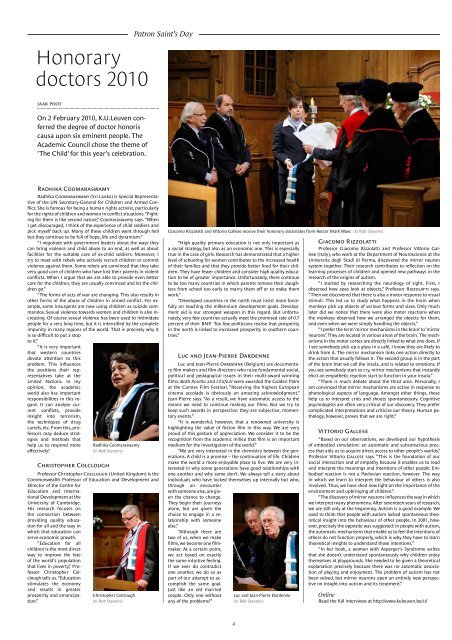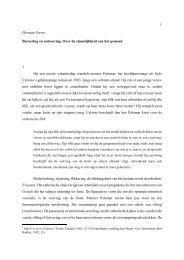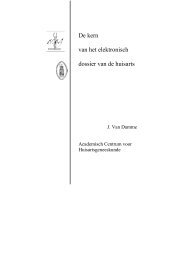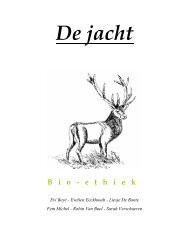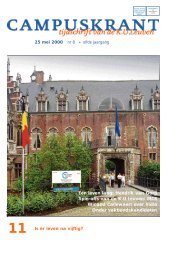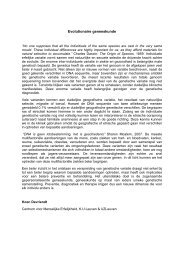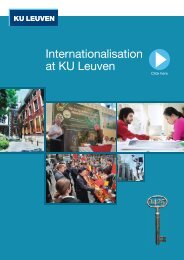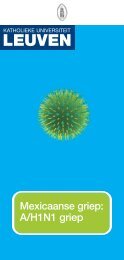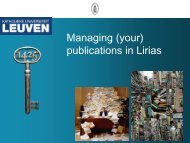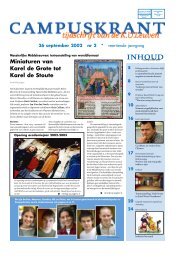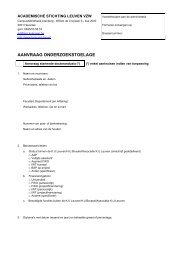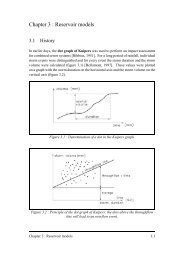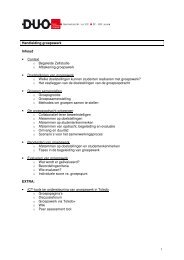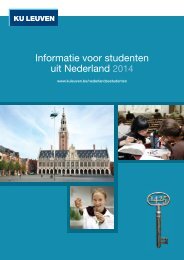MIND SPELLER - KU Leuven
MIND SPELLER - KU Leuven
MIND SPELLER - KU Leuven
Create successful ePaper yourself
Turn your PDF publications into a flip-book with our unique Google optimized e-Paper software.
Honorary<br />
doctors 2010<br />
Patron Saint's Day<br />
Jaak Poot<br />
On 2 February 2010, K.U.<strong>Leuven</strong> conferred<br />
the degree of doctor honoris<br />
causa upon six eminent people. The<br />
Academic Council chose the theme of<br />
‘The Child’ for this year’s celebration.<br />
Radhika Coomaraswamy<br />
Radhika Coomaraswamy (Sri Lanka) is Special Representative<br />
of the UN Secretary-General for Children and Armed Conflict.<br />
She is famous for being a human rights activist, particularly<br />
for the rights of children and women in conflict situations. “Fighting<br />
for them is like second nature,” Coomaraswamy says. “When<br />
I get discouraged, I think of the experience of child soldiers and<br />
pick myself back up. Many of these children went through hell<br />
but they continue to be full of hope, life and dynamism.”<br />
“I negotiate with government leaders about the ways they<br />
can bring violence and child abuse to an end, as well as about<br />
facilities for the suitable care of ex-child soldiers. Moreover, I<br />
try to meet with rebels who actively recruit children or commit<br />
violence against them. Some rebels are convinced that they take<br />
very good care of children who have lost their parents in violent<br />
conflicts. When I argue that we are able to provide even better<br />
care for the children, they are usually convinced and let the children<br />
go.”<br />
“The forms of acts of war are changing. This also results in<br />
other forms of the abuse of children in armed conflict. For example,<br />
some insurgents are now using children as suicide commandos.<br />
Sexual violence towards women and children is also increasing.<br />
Of course sexual violence has been used to intimidate<br />
people for a very long time, but it is intensified by the complete<br />
impunity in many regions of the world. That is precisely why it<br />
is so difficult to put a stop<br />
to it.”<br />
“It is very important<br />
that western countries<br />
devote attention to this<br />
problem. This influences<br />
the positions their representatives<br />
take at the<br />
United Nations. In my<br />
opinion, the academic<br />
world also has important<br />
responsibilities in this regard.<br />
It can analyse current<br />
conflicts, provide<br />
insight into terrorism,<br />
the techniques of drug<br />
cartels, etc. From this, professors<br />
may deduce strategies<br />
and methods that<br />
help us to respond more<br />
effectively.”<br />
Christopher Colclough<br />
Professor Christopher Colclough (United Kingdom) is the<br />
Commonwealth Professor of Education and Development and<br />
Director of the Centre for<br />
Education and International<br />
Development at the<br />
University of Cambridge.<br />
His research focuses on<br />
the connection between<br />
providing quality education<br />
for all and the way in<br />
which that education can<br />
serve economic growth.<br />
“Education for all<br />
children is the most direct<br />
way to improve the fate<br />
of the world’s population<br />
that lives in poverty,” Professor<br />
Christopher Colclough<br />
tells us. “Education<br />
stimulates the economy<br />
and results in greater<br />
prosperity and emancipation.”<br />
Radhika Coomaraswamy<br />
(© Rob Stevens)<br />
Christopher Colclough<br />
(© Rob Stevens)<br />
Giacomo Rizzolatti and Vittorio Gallese receive their honorary doctorates from Rector Mark Waer. (© Rob Stevens)<br />
“High quality primary education is not only important as<br />
a social strategy, but also as an economic one. This is especially<br />
true in the case of girls. Research has demonstrated that a higher<br />
level of schooling for women contributes to the increased health<br />
of their families and that they provide better food for their children.<br />
They have fewer children and consider high quality education<br />
to be of greater importance. Unfortunately, there continue<br />
to be too many countries in which parents remove their daughters<br />
from school too early to marry them off or to make them<br />
work.”<br />
“Developed countries in the north must insist more forcefully<br />
on reaching the millennium development goals. Development<br />
aid is our strongest weapon in this regard. But unfortunately,<br />
very few countries actually meet the promised rate of 0.7<br />
percent of their BNP. Too few politicians realise that prosperity<br />
in the north is linked to increased prosperity in southern countries.”<br />
Luc and Jean-Pierre Dardenne<br />
Luc and Jean-Pierre Dardenne (Belgium) are documentary<br />
film makers and film directors who raise fundamental social,<br />
political and pedagogical issues in their multi-award winning<br />
films. Both Rosetta and L’Enfant were awarded the Golden Palm<br />
at the Cannes Film Festival. “Receiving the highest European<br />
cinema accolade is obviously an amazing acknowledgment,”<br />
Jean-Pierre says. “As a result, we have automatic access to the<br />
means we need to continue making our films. But we try to<br />
keep such awards in perspective: they are subjective, momentary<br />
events.”<br />
“It is wonderful, however, that a renowned university is<br />
highlighting the value of fiction film in this way. We are very<br />
proud of this gesture of appreciation. We consider it to be the<br />
recognition from the academic milieu that film is an important<br />
medium for the investigation of the world.”<br />
“We are very interested in the chemistry between the generations.<br />
A child is a promise – the continuation of life. Children<br />
make the world a more enjoyable place to live. We are very interested<br />
in why some generations have good relationships with<br />
one another and why some don’t. We always tell a story about<br />
individuals who have locked themselves up internally but who,<br />
through an encounter<br />
with someone else, are given<br />
the chance to change.<br />
They begin their journeys<br />
alone, but are given the<br />
choice to engage in a relationship<br />
with someone<br />
else.”<br />
“Although there are<br />
two of us, when we make<br />
films, we become one filmmaker.<br />
At a certain point,<br />
we act based on exactly<br />
the same intuitive feeling.<br />
If we ever do contradict<br />
one another, we do so as<br />
part of our attempt to accomplish<br />
the same goal.<br />
Just like an old married<br />
couple. Only one without<br />
any of the problems!”<br />
Luc and Jean-Pierre Dardenne<br />
(© Rob Stevens)<br />
Giacomo Rizzolatti<br />
Professor Giacomo Rizzolatti and Professor Vittorio Gallese<br />
(Italy), who work at the Department of Neuroscience at the<br />
Universita degli Studi di Parma, discovered the mirror neuron<br />
system together. Their research contributes to reflection on the<br />
learning processes of children and opened new pathways in the<br />
research of the origins of autism.<br />
“I started by researching the neurology of sight. First, I<br />
observed how apes look at objects,” Professor Rizzolatti says.<br />
“Then we discovered that there is also a motor response to visual<br />
stimuli. This led us to study what happens in the brain when<br />
monkeys pick up objects of various forms and sizes. Only much<br />
later did we notice that there were also motor reactions when<br />
the monkeys observed how we arranged the objects for them,<br />
and even when we were simply handling the objects.”<br />
“I prefer the term ‘mirror mechanisms in the brain’ to ‘mirror<br />
neurons’. They are located in various areas of the brain. The mechanisms<br />
in the motor cortex are directly linked to what one does. If<br />
I see somebody pick up a glass in a café, I know they are likely to<br />
drink from it. The mirror mechanism links one action directly to<br />
the action that usually follows it. The second group is in the part<br />
of the brain that we call the insula, and is related to emotions. If<br />
you see somebody start to cry, mirror mechanisms that instantly<br />
elicit an empathetic reaction start to function in your insula.”<br />
“There is much debate about the third area. Personally, I<br />
am convinced that mirror mechanisms are active in response to<br />
phonological aspects of language. Amongst other things, these<br />
help us to interpret cries and shouts spontaneously. Cognitive<br />
psychologists are often very critical of our discovery. They prefer<br />
complicated interpretations and criticise our theory. Human pathology,<br />
however, proves that we are right.”<br />
Vittorio Gallese<br />
“Based on our observations, we developed our hypothesis<br />
of embodied simulation: an automatic and subconscious process<br />
that aids us to acquire direct access to other people’s worlds,”<br />
Professor Vittorio Gallese says. “This is the foundation of our<br />
social interaction and of empathy because it enables us to read<br />
and interpret the meanings and intentions of other people. Embodied<br />
reaction is not a Pavlovian reaction, however. The way<br />
in which we learn to interpret the behaviour of others is also<br />
involved. Thus, we have shed new light on the importance of the<br />
environment and upbringing of children.”<br />
“The discovery of mirror neurons influences the way in which<br />
we interpret many phenomena. After seventeen years of research,<br />
we are still only at the beginning. Autism is a good example. We<br />
used to think that people with autism lacked spontaneous theoretical<br />
insight into the behaviour of other people. In 2001, however,<br />
precisely the opposite was suggested: in people with autism,<br />
the automatic mechanisms that enable us to feel the intentions of<br />
others do not function properly, which is why they have to learn<br />
theoretical insights to understand those intentions.”<br />
“In her book, a woman with Asperger’s Syndrome writes<br />
that she doesn’t understand spontaneously why children enjoy<br />
themselves at playgrounds. She needed to be given a theoretical<br />
explanation precisely because there was no automatic association<br />
of playing and enjoyment. The problem of autism has not<br />
been solved, but mirror neurons open an entirely new perspective<br />
on insight into autism and its treatment.”<br />
Online<br />
Read the full interviews at http://www.kuleuven.be/ci/<br />
4


